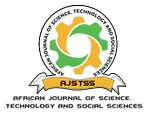Ideological features in Kenya Supreme Court judgments
DOI:
https://doi.org/10.58506/ajstss.v1i1.43Keywords:
Court judgements, Election petitions, Supreme court, Critical discourse analysisAbstract
Legal discourse is characterised by unique grammatical, lexical and stylistic features which are meant to enhance clarity and precision in the legal content. However, from a critical perspective, some of the discursive and stylistic features used alienate the common person and elevate judges and lawyers to an ideological pedestal. This study undertook a Critical Discourse Analysis of Kenya Supreme Court judgements on election petitions and civil cases with a view to investigate the discursive features used to represent legal ideology. The study was guided by Critical Discourse Analysis theory and a qualitative research design was used. The population for this study comprised the judgements made by the Kenya Supreme Court since its inception in 2010. Purposive sampling was used to identify five judgements on election petitions and civil cases. Guided by the CDA theory, features representing legal ideology were explored and discussed. The features include use of lexical stylistic features, performative verbs, legitimation, presuppositions, argumentation, interrogative forms, metaphors, precedence and predication. These features were meant to create precision and authority in the Supreme Court judgements. However, from a critical perspective, it was imminent that the features led to elevation of judges and lawyers as custodians of justice while the ordinary person was excluded from the legal process. The insight from this study is applicable to Forensic Linguistics and legal drafting. Judges and lawyers ought to use language in such a way that the common person is not excluded. Technical terminology should be used when necessary more so in contexts that involve only the legal personnel. In legal contexts that involves the ordinary person, plain language should be used.


